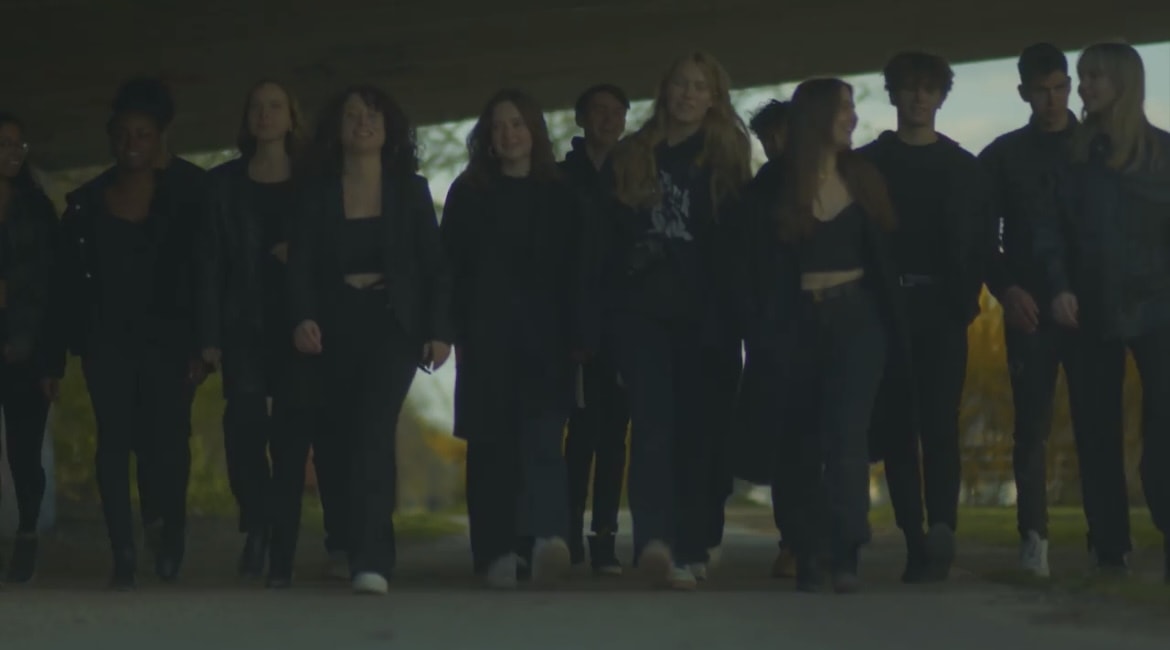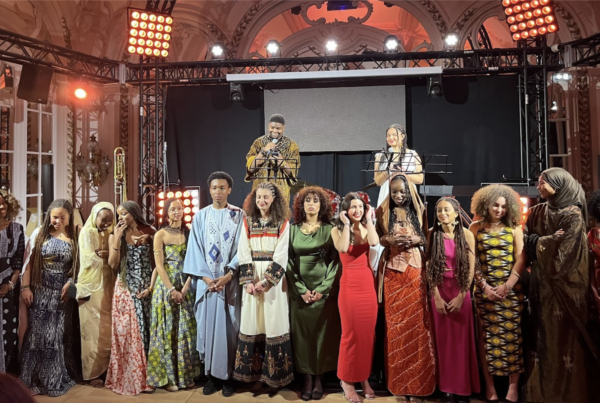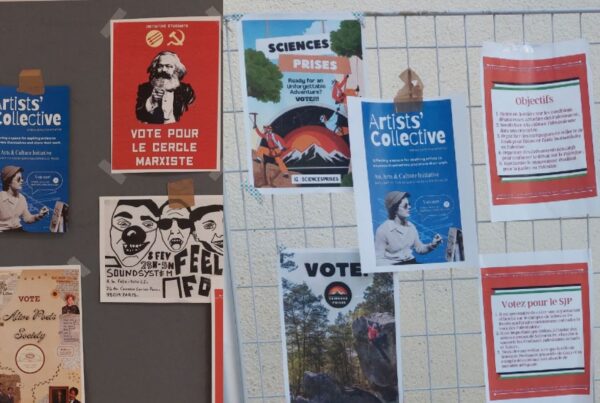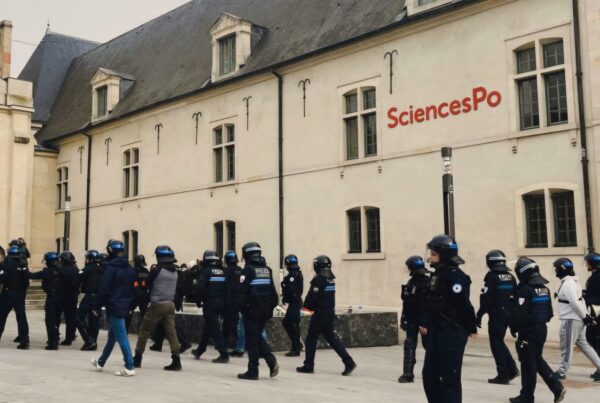Interviewed by Lily Barnett & Matthieu Le
This interview and the other campaign list interviews were conducted by writers of the Sundial Press. To ensure uniformity across list interviews, interviewees were given the same amount of time to answer questions, and lists for the same permanent bureau (ex. the two BDA lists) received the same questions. The interviewees had not seen the questions they would be asked, and a member of the campaign committee also assisted and supervised the interview. Although the interviews have been edited for clarity and concision, everything written was said by the list members.
Today, we’re here to provide a little insight into Nirvanart, a campaign list running for the Bureau des Arts (BDA) during the 2022 Campaign Week on campus. We met with Zoe Silverman and Haical Andra, the co-presidents of Nirvanart.
(responses in French below)
Nirvanart Team Members
Executive Pole
Zoe Silverman: President, French and American (EURAM)
Haical Andra: Vice President, French and Indonesian (EURAM)
Sandrine Phemius: Secretary, Guadeloupean (EURAF)
Antoine Goullin: Treasurer, French and Italian (EURAM)
Events Pole
Daphne Stefani: Head of Events, French (EURAM)
Awa Seck: Performances, French,Turkish, American, and Senegalese (EURAM)
Ines Berrahou: Performances, French (EURAF)
Mahira Soifiyoudine: Events Off Campus, French and Malagasy (EURAF)
Dana Fidawy: Workshops, Lebanese (EURAM)
Communications Pole
Paloma Senecal: Visuals, French (EURAM)
Cristina Marquigny: Coordination, French and Greek (EURAF)
Thomas Chassat: Sound, French (EURAM)
Partnerships Pole
Emma Aguerre: Head of Partnerships, French (EURAM)
Thomas Lesage: Partnerships Off Campus, French (EURAM)
Noah Nosquaux: Partnerships Off Campus, French (EURAF)
Ambihai Akilan: Partnerships On Campus, Canadian (EURAM)
Q: Please briefly introduce your list and the members of your team.
Zoe: Our list is called Nirvanart and this year our main philosophy is to democratize art and make art more accessible for all students. We think the BDA has done a great job proposing things for artists but we want to do things for people who aren’t necessarily artists but who want to get involved. We want to make art really accessible and introduce other forms of art, not only traditional art. We have a mix of lots of different artists: we have dancers, we have digital artists, we have musicians, we have painters, we have everything.
Q: Why is your list running? What are you hoping to bring to campus life at the Reims Campus of Sciences Po?
Zoe: We decided to build this BDA list in January. We really loved a lot of the stuff that the BDA did but we felt like we didn’t hear about them too much, usually just in collabs with other assos. There were a few projects they did that we thought could have been pushed even further. We thought a lot of the projects they did, like the open mics, were very accessible and fun for people who are artists, but there weren’t that many things put in place for people who want to become artists and work on art. We want to bring artists in to do collaborative workshops and even propose Sciences Po artists to give workshops to other students. For example, we would propose workshops with the cultural assos for different holidays to create art based around the holiday with a focus on that specific country. So maybe team up with AIRA to do Asian calligraphy, things like that. I think there’s really the potential to do great things for every student at Sciences Po: artist or not artist.
Haical: The main point is inclusivity.
Q: In what ways do the members of your list accurately represent the diverse student body of Reims?
Haical: There’s a diversity in talents, and also in backgrounds and origins.
Zoe: We really have people from all over the world in our list, and you can check out our Instagram where we present where everyone is from. We have as many French speakers as English speakers and most people speak both languages on our list. Besides all of the different art forms we represent, we have a really big diversity of ideas for next year and what we want to bring to campus for the arts and culture.
Q: In your opinion, what is the main shortcoming of the permanent association you are running for, and how do you wish to address these shortcomings during the next academic year if you are elected?
Zoe: I think one of the events I loved the most that the BDA did was the cinema month, when they paired up with different cultural assos, which was great because it really introduced a different art form. One of them was Jafar Panahi, who is an Iranian director and producer who got banned. That’s something we want to emphasize even more. Our theme is underground and underrepresented art so we want to bring in banned art – like banned books, art that has been reprimanded, and artists who have been put into jail for their art – and we want to give everyone a voice. We really loved what the BDA did with the postcards where everyone could write letters, but we thought something that could be cool would be like a poetry workshop, to teach people how to write poetry to send to each other like the postcards. We want to make not just Sciences Po art but the art world in general more accessible, so like helping to find art internships or collaborative art projects with all of the campuses. We want to do a thing called Humans of Sciences Po where every human at Sciences Po contributes to one art piece. We want to bring in, for example, big photographers like JR, to do political art movements with the whole school over a semester. We want to do a cultural pass but specifically for Sciences Po students across the world, so that 3As can have places to go and have access to art no matter where they are. We also want to do a trip: the BDE did a trip, the AS did a trip, and we want to do a BDA trip to Berlin. We think it fits our theme well as an underrepresented art city. Overall, we have a bunch of projects we want to put forward for next year.
Haical: We have different events planned for promoting art, that’s the main point.
Q: How do you plan to promote arts on campus next year and make the arts more accessible to the student body?
Zoe: Having professional artists come and work with students, who are artists or not. Having Sciences Po artists teach their art, with dance workshops or music workshops – more collaborative events. Continuing performances obviously, because we want to give everyone a chance to show off what they can do, but we also want to make connections between people and work together. Which is what we plan to do… when we win.
Q: If students want to learn more about your mission and what your campaign offers, what is the best way for them to find out?
Zoe: Probably Instagram. We have an amazing comm – shoutout to the comm team – that we’ve worked on pretty hard. We state pretty clearly our philosophy and our actions for next year: 15 concrete actions we have set to put in place. Watch our campaign video to get a gist of who we are, and come to our stand and our events!
— — — — —
Q : Veuillez présenter brièvement votre liste et les membres de votre équipe.
Zoe : Notre liste s’appelle Nirvanart et cette année notre philosophie principale est de démocratiser l’art et de le rendre plus accessible à tous les étudiants. Nous pensons que le BDA a fait un excellent travail en proposant des choses pour les artistes mais nous voulons faire des choses pour les gens qui ne sont pas nécessairement des artistes mais qui veulent s’impliquer. Nous voulons rendre l’art vraiment accessible et introduire d’autres formes d’art, pas seulement l’art traditionnel. Nous avons un mélange de beaucoup d’artistes différents : nous avons des danseurs, des artistes numériques, des musiciens, des peintres, nous avons de tout.
Q : Pourquoi votre liste se présente-t-elle aux campagnes ? Qu’espérez-vous apporter à la vie de campus du Campus de Reims de Sciences Po ?
Zoe : Nous avons décidé de construire cette liste BDA en janvier. Nous avons vraiment aimé beaucoup de choses que le BDA a fait mais nous avions l’impression que nous n’entendions pas beaucoup parler d’eux, on les voyait surtout en collaboration avec d’autres assos. Il y a quelques projets qu’ils ont réalisés et qui auraient pu être poussés encore plus loin. Nous avons pensé que beaucoup de leurs projets, comme les open mics, étaient très accessibles et amusants pour les artistes, mais il n’y avait pas beaucoup de ressources mises en place pour les personnes qui veulent devenir des artistes et travailler dans le monde de l’art. Nous voulons faire venir des artistes pour faire des ateliers collaboratifs et même proposer aux artistes de Sciences Po de donner des ateliers à d’autres étudiants. Par exemple, nous proposerions des ateliers avec les assos culturelles pour différentes fêtes afin de créer des œuvres d’art autour de la fête en mettant l’accent sur ce pays spécifique. On pourrait par exemple s’associer à l’AIRA pour faire de la calligraphie asiatique, des choses comme ça. Je pense qu’il y a vraiment le potentiel pour faire de grandes choses pour chaque étudiant de Sciences Po : artiste ou non artiste.
Haical : Le point principal est l’inclusivité.
Q : En quoi les membres de votre liste représentent-ils la diversité étudiante du Campus de Reims ?
Haical: Il y a une diversité de talents, mais aussi de parcours et d’origines.
Zoe: Nous avons vraiment des gens du monde entier dans notre liste, et vous pouvez consulter notre Instagram où nous présentons les origines de chacun. Nous avons autant de francophones que d’anglophones et la plupart des gens parlent les deux langues sur notre liste. En plus de toutes les différentes formes d’art que nous représentons, nous avons une très grande diversité d’idées pour l’année prochaine et ce que nous voulons apporter au campus pour les arts et la culture.
Q : Selon vous, quelle est la principale faiblesse de l’association permanente pour laquelle vous vous présentez et comment souhaitez-vous y remédier lors de la prochaine année universitaire si vous êtes élu ?
Zoe : Je pense que l’un des événements que j’ai le plus aimé du BDA est le mois du cinéma, où ils se sont associés à différentes associations culturelles, ce qui était génial car cela permettait de présenter une forme d’art différente. L’un d’eux était Jafar Panahi, un réalisateur et producteur iranien qui a été interdit. C’est quelque chose que nous voulons mettre encore plus en avant. Notre thème est l’art underground et sous-représenté, nous voulons donc introduire l’art interdit – comme les livres interdits, l’art qui a été réprimandé, et les artistes qui ont été mis en prison pour leur art – et nous voulons donner à chacun une voix. Nous avons vraiment aimé ce que le BDA a fait avec les cartes postales où tout le monde pouvait écrire des lettres, mais nous avons pensé que quelque chose qui pourrait être cool serait comme un atelier de poésie, pour apprendre aux gens à écrire des poèmes à envoyer les uns aux autres comme les cartes postales. Nous voulons rendre plus accessible non seulement l’art de Sciences Po mais aussi le monde de l’art en général, en aidant à trouver des stages d’art ou des projets artistiques collaboratifs avec tous les campus. Nous voulons faire un truc appelé Humans of Sciences Po où chaque personne de Sciences Po contribue à une œuvre d’art. Nous voulons faire venir, par exemple, de grands photographes comme JR, pour faire des mouvements artistiques politiques avec toute l’école pendant un semestre. Nous voulons faire un pass culturel mais spécifiquement pour les étudiants de Sciences Po à travers le monde, afin que les 3A puissent avoir des endroits où aller et avoir accès à l’art où qu’ils soient. Nous voulons aussi faire un voyage : le BDE a fait un voyage, l’AS a fait un voyage, et nous voulons faire un voyage du BDA à Berlin. Nous pensons que cela correspond bien à notre thème en tant que ville d’art sous-représentée. Globalement, nous avons un tas de projets que nous voulons mettre en avant pour l’année prochaine.
Haical : Nous avons prévu différents événements pour promouvoir l’art, c’est le point principal.
Q : Comment comptez-vous promouvoir les arts sur le campus l’année prochaine et rendre les arts plus accessibles au corps étudiant ?
Zoe: Faire venir des artistes professionnels pour travailler avec les étudiants, qu’ils soient artistes ou non. Faire en sorte que des artistes de Sciences Po enseignent leur art, avec des ateliers de danse ou de musique – plus d’événements collaboratifs. Continuer les spectacles évidemment, parce que nous voulons donner à chacun une chance de montrer ce qu’il sait faire, mais nous voulons aussi créer des liens entre les gens et travailler ensemble. C’est ce que nous prévoyons de faire… quand nous aurons gagné.
Q : Si les étudiants veulent en savoir plus sur votre mission et ce que votre campagne offre, quel est le meilleur moyen pour eux de le découvrir ?
Zoe : Probablement sur Instagram. Nous avons une communication incroyable – bravo à l’équipe de communication – sur laquelle nous avons beaucoup travaillé. Nous y exposons assez clairement notre philosophie et nos actions pour l’année prochaine : 15 actions concrètes que nous nous sommes fixés de mettre en place. Regardez notre vidéo de campagne pour avoir une idée de qui nous sommes, et venez à notre stand et à nos événements !
Other posts that may interest you:
- The Trouble with ‘Ecocide’
- Carbon dioxide removal – hit or miss?
- Local Victories for Turkish Opposition — A Sign of Hope?
- Are France and Japan a Mismatch Made in Heaven?
- A Reflection on Dark Tourism
Discover more from The Sundial Press
Subscribe to get the latest posts sent to your email.





